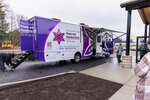
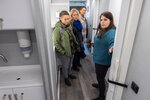
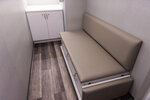









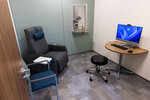



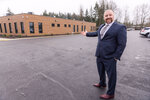
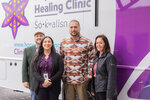
According to the Washington State Health Care Authority, Indigenous people face above-average rates of opioid and fentanyl-related overdose deaths.
“American and Alaska Native people are getting hit harder than just about any community that's out there,” said Aren Sparck, a Chevak Native Village Qissunamiut tribal member with the Washington State Health Care Authority.
But, as substance abuse rates rise in and around reservations, Sparck said, so have efforts to build tribal-led infrastructure for members and the general public.
“That's what a lot of our tribal leaders in the state of Washington are doing,” Sparck said. “Showing that we can lead the way.”
On Thursday, Dec. 14, visitors from as far as Idaho joined members of the Chehalis Tribe and public officials for a tour of Hope and Healing Clinic, a new opioid treatment program location equipped with a mobile care unit, located at 9474 Lathrop Industrial Drive SW in Tumwater.
Earlier this year, Chairman Dustin Klatush of the Confederated Tribes of the Chehalis Reservation met with Gov. Jay Inslee and tribal leaders from across the state to discuss the opioid crisis in and around reservations in Washington.
“We're hoping, with the opioid pandemic right now that we're in, this is going to be a big, big start to helping out,” Klatush said. “(Inslee) doesn't think there's a pandemic, but we tribal people know that there is a pandemic out there.”
The clinic, which will be open to both members and non-members of the Chehalis Tribe, aims to help people suffering from opioid addiction through medicated treatment — which includes the use of Methadone, Suboxone and Vivitrol — and the latest electronic medical record technology to track patients on their road to recovery. Outreach coordinators will also help clients connect with local resources including food and housing while in the program.
Tour leaders last week said the entire clinic is meant to provide comfort for staff and patients alike.
“We're so excited and we're so invested in being here to see this in fruition,” Sparck said. “Right now, we (in Washington) still don't have enough providers. We still don't have enough places. So when I see something like this, it's the hope.”
Organizers are aiming to provide care on and off the Chehalis Reservation, breaking down barriers for people with disabilities or other difficulties traveling with the new mobile unit.
“I'm happy that Chairman Klatush is out there doing this because he's not just thinking about his own people, but everybody in the communities around them,” Sparck said. “We've been doing this since time immemorial. Now it's time to partner with the rest of our communities. I think what we're doing is also healing our communities at the same time.”
Accessible non-emergency medical transport vehicles in addition to the new mobile treatment center will allow care to reach those who are unable to travel to Tumwater on their own. The mobile units are fully self-sustaining and connected to the clinic. The RV, converted by Mission Mobile Medical, is equipped with a telehealth room that’s HIPAA compliant, a dispensary which meets all the DEA requirements for safety and storage of medications, and a private bathroom for urine analysis.
On Dec. 14, crews were working to update security for the housing and transportation of medication while awaiting certification from the DEA, which could come as early as January.
“We care about our communities on the outside of the reservation: Lewis County, Thurston County and Grays Harbor, and our plan is to help everybody out,” Klatush said. “I've been talking with Commissioner Swope and we've been chatting about that quite a bit, about stationing one of our mobile units down there in Lewis County to help our people out there, because they're so close to the reservation. Lewis County is a big part of our community.”
Josette Ross, director of client success with Indigenous PACT: Tribal Healthcare Consulting, said that because of a “longstanding stigma” around substance abuse disorders. “It's hard enough to ask for help. We don't want to give any other reason that folks don't want to come ask for help. If we identify a barrier, we're going to try and solve that.”
Staff training at the facility began last week as professionals toured the building and mobile medical unit while receiving education and guidance on how to operate the new technology including the electronic medical records system.
“I would say that it is definitely using technology to its fullest,” said Lewis County Commissioner Sean Swope. “They're coming to the room and you're getting expedited care versus going to a doctors clinic, sitting in a room for 15 minutes, staring at the wall. You're going to get immediate care when people are coming in, which I think is fantastic.”
The Hope and Health Clinic lobby features no front desk, which is part of their philosophy, having no barriers between staff and patients in recovery, Ross said. Instead of repurposing an already existing space, this building was built from the ground up, by the Chehalis Tribe, with those intentions in mind.
“We want people to come into this space and feel welcome,” Ross said. “Feel like they are seen, that they are important, and that we are going to help them get better.”